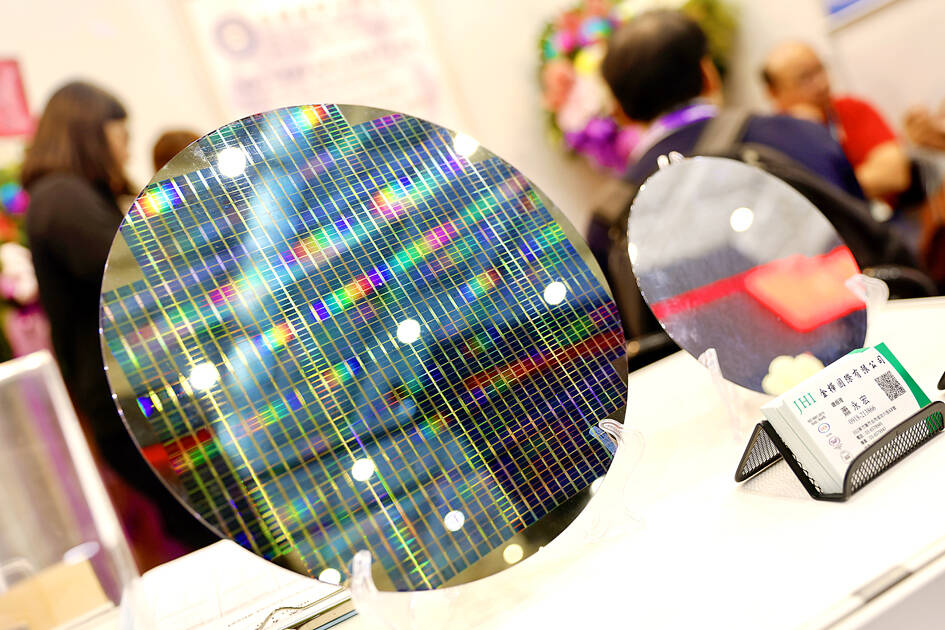Taiwan’s semiconductor industry is expected to see its production value grow by 16.5 percent next year to top NT$6.17 trillion (US$192.28 billion) for the first time, fueled by sustained demand for artificial intelligence (AI) and high-performance computing (HPC) devices such as servers and data centers, the Industrial Technology Research Institute (ITRI, 工研院) said yesterday.
That meant Taiwan would outpace the global semiconductor industry, which is expected to expand by 12.5 percent in production value to US$684 billion next year, according to the institute.
Taiwan’s foundry sector would be the biggest beneficiary of this AI boom, with an annual expansion of 20.1 percent in production value next year to NT$3.86 trillion, Terry Fan (范哲豪), a semiconductor analyst with ITRI’s Science and Technology International Strategy Center, said at an industry forum in Taipei.

Photo: RITCHIE B. TONGO, EPA-EFE
The foundry sector’s production value would reach NT$28.60 billion next year, thanks largely to robust demand for advanced technologies including 3-nanometer and 2-nanometer chips, Fan said.
“The rise of generative AI is stimulating demand for HPC devices that are powered by advanced chips,” Fan said. “That is reflected in the fact that more than half of Taiwan Semiconductor Manufacturing Co’s (TSMC, 台積電) wafer revenue came from HPC chips.”
TSMC is a major supplier of 3-nanometer technology in the industry and would be the world’s first to offer 2-nanometer technology next year, the company said.
The production value of local chip packaging and testing service providers next year is projected to grow 12.7 percent to NT$700 billion, an all-time high, as firms use advanced technologies, primarily 2.5-dimension chip-on-wafer-on-substrate technology, to package advanced chips used in AI and HPC devices, Fan said.
A recovery in sales of smartphones, PCs and other consumer electronics would also propel growth, he said.
Globally, the advanced packaging market next year would surpass the traditional chip packaging market for the first time and would make up about 51 percent of the total chip packaging market, the institute projected.
ITRI yesterday also raised its growth forecast for the nation’s semiconductor producers to 22 percent, or NT$5.3 trillion, up from its previous estimate of 17.7 percent. This would be the highest year-on-year increase since 2021.
It attributed the upward adjustment to faster-than-expected growth in the foundry sector, which is expected to see production value grow 27.5 percent this year, compared with an earlier estimate of 20.2 percent growth, the institute said.
Local chip designers are also expected to grow at a faster rate of 16.5 percent this year, up from the previous estimate of 5.1 percent, it added.
However, the institute trimmed its growth forecasts for chip packagers and chip testers to 8.6 percent and 5.2 percent respectively this year, down from previous estimates of 10.5 percent and 13.3 percent.

Macronix International Co (旺宏), the world’s biggest NOR flash memory supplier, yesterday said it would spend NT$22 billion (US$699.1 million) on capacity expansion this year to increase its production of mid-to-low-density memory chips as the world’s major memorychip suppliers are phasing out the market. The company said its planned capital expenditures are about 11 times higher than the NT$1.8 billion it spent on new facilities and equipment last year. A majority of this year’s outlay would be allocated to step up capacity of multi-level cell (MLC) NAND flash memory chips, which are used in embedded multimedia cards (eMMC), a managed

CULPRITS: Factors that affected the slip included falling global crude oil prices, wait-and-see consumer attitudes due to US tariffs and a different Lunar New Year holiday schedule Taiwan’s retail sales ended a nine-year growth streak last year, slipping 0.2 percent from a year earlier as uncertainty over US tariff policies affected demand for durable goods, data released on Friday by the Ministry of Economic Affairs showed. Last year’s retail sales totaled NT$4.84 trillion (US$153.27 billion), down about NT$9.5 billion, or 0.2 percent, from 2024. Despite the decline, the figure was still the second-highest annual sales total on record. Ministry statistics department deputy head Chen Yu-fang (陳玉芳) said sales of cars, motorcycles and related products, which accounted for 17.4 percent of total retail rales last year, fell NT$68.1 billion, or

In the wake of strong global demand for AI applications, Taiwan’s export-oriented economy accelerated with the composite index of economic indicators flashing the first “red” light in December for one year, indicating the economy is in booming mode, the National Development Council (NDC) said yesterday. Moreover, the index of leading indicators, which gauges the potential state of the economy over the next six months, also moved higher in December amid growing optimism over the outlook, the NDC said. In December, the index of economic indicators rose one point from a month earlier to 38, at the lower end of the “red” light.

MediaTek Inc (聯發科) shares yesterday notched their best two-day rally on record, as investors flock to the Taiwanese chip designer on excitement over its tie-up with Google. The Taipei-listed stock jumped 8.59 percent, capping a two-session surge of 19 percent and closing at a fresh all-time high of NT$1,770. That extended a two-month rally on growing awareness of MediaTek’s work on Google’s tensor processing units (TPUs), which are chips used in artificial intelligence (AI) applications. It also highlights how fund managers faced with single-stock limits on their holding of market titan Taiwan Semiconductor Manufacturing Co (TSMC, 台積電) are diversifying into other AI-related firms.